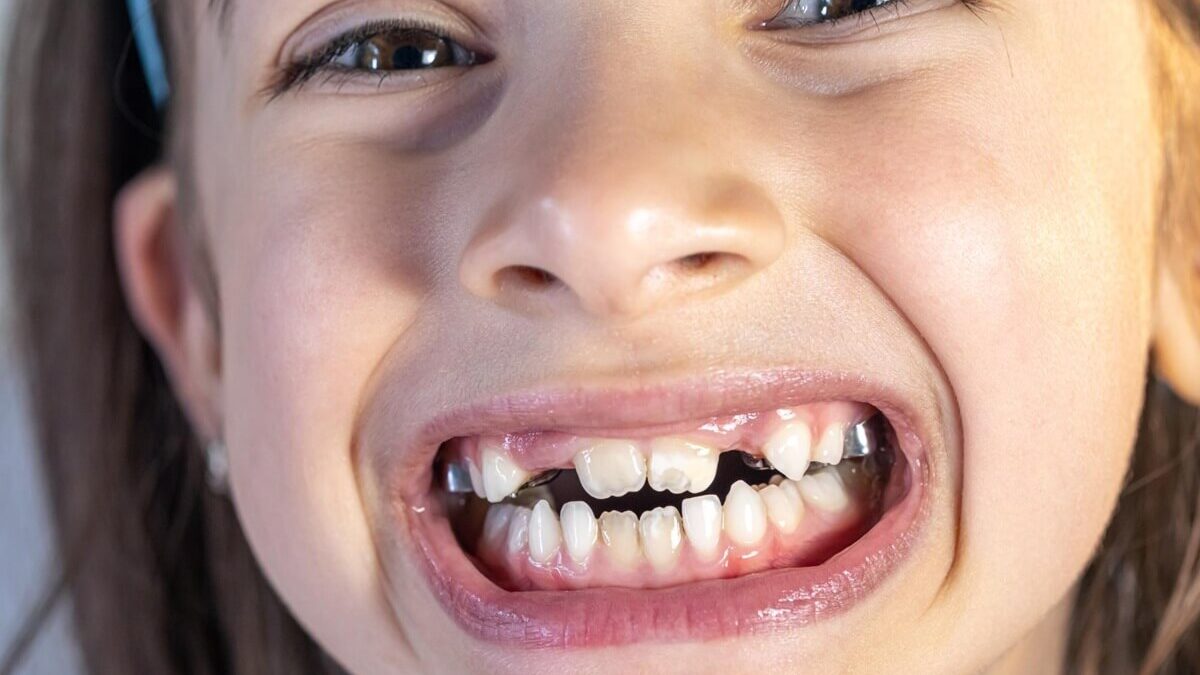8 Common Causes of Crooked Teeth

Do Dental Veneers Stain?
August 28, 2025
How to Control Bleeding After Wisdom Tooth Removal
September 4, 2025Many people deal with teeth that do not grow in a straight line. Some teeth crowd together, twist, or stick out. This is a common dental problem, and it does not always happen because of poor habits. There are many causes of crooked teeth, and some begin early in life. This guide explains the most common reasons why teeth grow crooked.
Table of Contents
TogglePoor Jaw Alignment
One of the main causes of crooked teeth is when the upper and lower jaws do not match. This condition makes the bite uneven and forces the teeth to shift from their natural path. The teeth may push forward, lean inward, or not touch properly when the mouth closes. Dentists call this a bite problem, and it can make daily tasks like chewing more difficult.
Early Baby Tooth Loss
Baby teeth hold space for adult teeth and guide them into place. When a baby tooth falls out too soon, the nearby teeth move into the empty space. This shift can block the new tooth or force it to come in crooked. Early loss of baby teeth is one of the leading causes of crooked teeth in children and can cause permanent misalignment without treatment.
Jaw Size
A small jaw often does not have enough space for all adult teeth to come in straight. This makes the teeth twist or overlap. Jaw size can affect the way teeth grow and lead to crowding. People today have smaller jaws compared to the past, which makes this one of the common causes of crooked teeth in modern times.
Poor Myofunctional Habits
Habits like thumb sucking, mouth breathing, and pushing the tongue against the teeth during swallowing affect the way the jaw and teeth develop. These habits apply pressure that moves the teeth out of position. When these habits continue past early childhood, they become one of the main causes of crooked teeth and can require orthodontic treatment to correct.
Genetics and Heredity
Family history plays a strong role in how teeth grow. If parents or grandparents had crowded teeth or bite problems, their children may face the same issues. Genetics can decide the size of the jaw, the shape of the teeth, and the timing of tooth development. This makes heredity one of the natural causes of crooked teeth.
Poor Dental Care
Neglecting dental hygiene can lead to infections, cavities, or gum disease. These problems weaken the bone and tissue that support the teeth. As a result, teeth lose stability and shift over time. Poor dental care is one of the preventable causes of crooked teeth, especially when left untreated for many years.
Poor Nutrition
What you eat affects how your teeth and bones grow. If your body does not get enough calcium, vitamin D, and other nutrients, your teeth can become weak, and your jaw may not grow the right way. This makes it hard for teeth to come in straight. Children need healthy food while they grow so their teeth have space and grow in the right position.
Facial Injury
An accident that hits the face or jaw can move the teeth out of place or change the shape of the jawbone. Even a small shift can cause long-term alignment issues. Injuries that affect the face or mouth are serious causes of crooked teeth and often require dental or orthodontic help to fix the damage.
Last Word
Crooked teeth can happen for many reasons, like jaw problems, bad habits, poor health, or even family history. Some causes start early in life and may not be easy to notice. But with the right care, crooked teeth can be fixed. At Kirkland Dental Excellence, the dentist checks your teeth, finds the cause, and creates a plan that fits your needs. With expert treatment, you can improve your smile, protect your teeth, and feel more confident every day.
FAQs
What are my options for straightening my teeth?
Treatment options include clear aligners like Invisalign, metal braces, ceramic braces, and cosmetic options like veneers.
What should I expect when I see a dentist or orthodontist?
The best dentist in Kirkland examines your teeth, checks your bite, and may take X-rays. After the exam, the dentist explains your treatment options and creates a plan to straighten your teeth.
How do orthodontists fix misaligned teeth?
Orthodontists use tools like braces, aligners, retainers, or jaw expanders to move the teeth into a better position. Each case requires a specific plan based on the alignment problem.
What problems come with crooked teeth and misaligned bites?
Crooked teeth can cause tooth decay, gum problems, pain in the jaw, trouble chewing, and speech issues. These problems often get worse without treatment.
How to know if my teeth are crooked or my bite is misaligned?
Signs include overlapping teeth, large gaps, difficulty biting, jaw discomfort, or teeth that do not touch correctly when you close your mouth.




